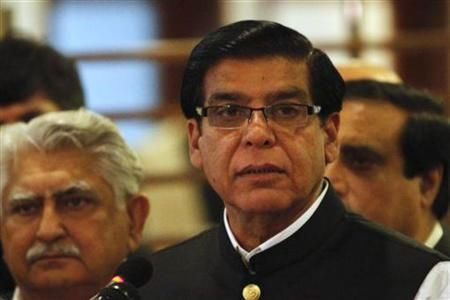Stop The Presses: Pakistan’s Government Completes Full Term Without Military Coup Or Violence

The elected civilian government of Pakistan achieved a dubious milestone of sorts over the weekend -- it stepped down as scheduled, completing its five-year term peacefully in the absence of any military takeover or coup or murders or assassinations.
In Pakistan’s 65-plus-year history, no elected government has ever completed its full term.
“It was a natural demise, not a violent death,” commented BBC correspondent M. Ilyas Khan. “There was no political upheaval, and no military intervention. Never before has a civilian government packed up so peacefully.”
Following the dissolution of parliament at midnight on Saturday, an interim government will now come into place, until national elections which are due to be held in May.
Indeed, Pakistan’s military has ruled the county for about half of the time since independence from Britain.
At a minimum, the peaceful transition would indicate that Pakistan’s parliamentary form of government has finally matured.
The outgoing prime minister, Raja Pervez Ashraf, hailed this event as historic (of sorts) in his televised farewell address to the nation, describing the peaceful transfer of power toward the next government in Islamabad as a triumph for democracy.
"No one will be able to harm democracy in the future," he stated. "There is a long history of tussle between the democratic and undemocratic forces in Pakistan, but the democratic forces have finally achieved a victory.”
While admitting that his Pakistan People’s Party (PPP) could not solve the country’s monumental problems, Ashraf promised the next poll would be free and fair.
"It is true that we could not meet the expectations of the people of Pakistan, but we tried our best to control the problems and strengthen democracy," he said, citing, among other measures, that his government raised the salaries of state workers and introduced some new development projects.
However, Ashraf, who came to power only after his predecessor, Yusuf Reza Gilani, was removed from office following a conviction for contempt by the Supreme Court, might be overly optimistic about the future of democracy in Pakistan, given the multitude of problems the country faces and the ever-present threats to that fragile democracy.
Aside from the looming shadow of Pakistan’s formidable military and intelligence network complex, sectarian violence and Islamic militancy continues to plague the nation.
The PPP will also have to deal with the public’s anger over repeated power outages; endemic corruption by senior government officials (Ashraf himself may face charges that he accepted bribes while serving as a minister); a simmering separatist insurgency in Baluchistan province; and an economy in tatters.
The two most formidable challengers to the PPP will likely be former cricket star and opposition figure Imran Khan and perennial candidate Nawaz Sharif of the Pakistan Muslim League-Nawaz (PML-N), himself a former prime minister.
A dark horse candidate could be none other than former president and military leader Gen. Pervez Musharraf, who said he will return from self-exile in Dubai to participate in the election (despite the fact that he may face criminal charges related to events in his rule from 1999 to 2008).
According to the New York Times, Sharif (who was removed by a military coup in 1999 that brought Musharraf to power), is running first in polls with 27 percent support, with the incumbent PPP a distant second.
Given that Sharif has no hope of securing a majority, he would have to form alliances with various other parties to create a new coalition government.
As for the army, an institution which has always lurked at or near the corridors of real power in Pakistan, Chief of Army Staff General Ashfaq Kayani has promised to keep his forces out of the political process… for now.
“The military is apparently standing aloof and letting the battle be fought among politicians, which is a rare thing and a healthy one,” Ahmed Bilal Mehboob of the Pakistan Institute of Legislative Development and Transparency told the New York Times.
Kayani's position, however, has likely been severely weakened by the continuing fallout from the assassination of al Qaeda chief Osama bin Laden by U.S. Special Forces at a compound near Islamabad almost two years ago -- the operation revealed that Pakistan’s army is either incompetent or complicit in the activities of militants.
The United States, whose suspicions about the true nature and alliances of Pakistan’s military and intelligence complex, will be watching the next election closely despite its misgivings. Washington needs Islamabad to clamp down on Islamic militancy and also avert a financial catastrophe that could prompt the proliferation of even more radical extremists groups.
© Copyright IBTimes 2024. All rights reserved.











